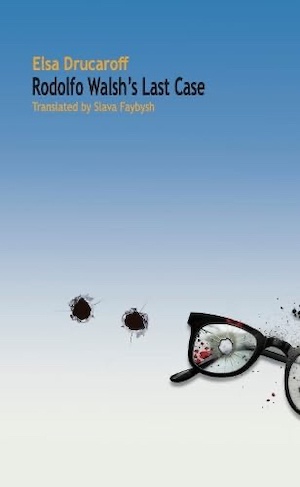Translated by Slava Faybysh — Fact and fiction overlap, reinforce, and illuminate each other in this historical ‘true crime’ novel by Argentine novelist and literature professor Elsa Drucaroff.
In real life, as in the novel, Rodolfo Walsh was a well-known Argentinian writer of detective fiction and an investigative journalist during the politically tumultuous 1950s and the two succeeding decades. He joined a militant underground group, the Montoneros, allied with the Peronists. The Montoneros appointed him their director of intelligence, and he was adept at ferreting out information to aid their cause. These activities and the militance of his daughter Maria Victoria (Vicki) made them targets of the regime. Walsh was eventually assassinated in 1977, the day after publishing his scathing Open Letter from a Writer to the Military Junta, criticising its economic policies.
Drucaroff weaves her novel around these facts and a compelling ‘what if?’ What if, using his skills as a writer of detective stories, Walsh investigated the disappearance of his 26-year-old daughter. She, along with four men, were involved in a shoot-out with army troops – tanks and helicopter included – but in Drucaroff’s story, he is tantalised by differing reports of the number of bodies removed from the building and whether the woman involved was still alive when she was taken away. He has to track down the facts.
You can see why Walsh might shift his attention away from his close involvement with the Montoneros, who are prone to lengthy discussions on Marxist principles – I hadn’t heard the phrase dialectical materialism in, I don’t know, decades? – and little practical strategy. They also all have real names and noms de guerre, and are sometimes referred to as one and sometimes as the other. This caused me more than a little confusion, from time to time.
Walsh is convinced that the intelligence he’s uncovered indicates the group’s path is doomed. But the younger militants are idealogues and believe the 49-year-old Walsh is out of touch. His advice and his ideas are ignored. He doesn’t turn his back on the radical group completely, however, and is duly alarmed by the gradual disappearance and assassination of so many of its leaders.
There’s danger in the air, and Walsh and his key contacts go about their business in increasing peril. Any slow-moving automobile following him or person camped out in a parked car near his apartment building can set off alarm bells for Walsh and his wife. As in so many politically fraught stories, peopled by spies and secret police, you can never be absolutely sure which side a character is on, and Drucaroff has some surprises in store.
Walsh and his wife Lila aren’t the only interesting characters in this novel. You also see how the military approaches the problem of the activists. A well-educated military recruit, Manuel, is the driver for a brutish general named Oddone. Oddone takes to Manuel, treating him almost as a son. He’s intrigued that Manuel is reading Plato and asks about it. Manuel recounts the Allegory of the Cave, which undoubtedly has broader meaning here. The piece of reality (the shadows on the wall of the cave) that the prisoners can perceive are not the whole story and not even the greatest danger to them. This is an interpretation that applies equally to the Argentinian military of the era and the Montoneros.
Another pair of characters that form a nice counterpoint to Walsh and his wife are the bickering couple, Colonel Carlos König and Carmen. The Colonel is a long-time friend of Walsh, and though their political paths have diverged, they retain some trust in each other. It’s to be seen which of them will help the other, when push comes to shove.
Drucaroff writes in a style somewhat different than English-language authors do. There’s less visual description. To keep the story moving, she places greater reliance on the significance of interactions among characters and their dialog. And move it does. It’s written in short segments – sometimes a page or two until the point of view changes, sometimes just a paragraph. From the beginning political arguments, where the story stalls a bit, to its acceleration with her cinematic cutting back and forth, the pace hurtles toward its dramatic climax.
In the end, Walsh has his answers, and his literary detective skills have stood him in good stead in clever ways. This fictional investigation into the whereabouts of his daughter was Walsh’s last case. Had Walsh pursued this investigation in real life, it would have been literally his last case, as he was assassinated shortly thereafter.
For another taste of Argentinian politics, set a few years later, try Eloísa Díaz’s Repentance.
Corylus Books
Print/Kindle
£3.29
CFL Rating: 4 Stars
